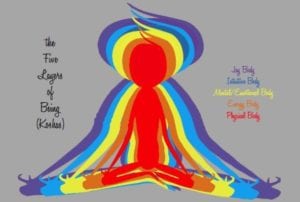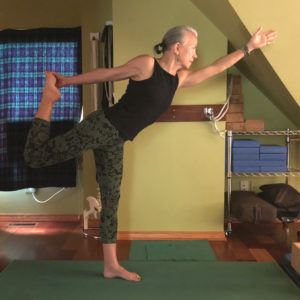This past weekend, I had a thoughtful conversation with several yoga students on a subject near and dear to my heart—divinity. This is often a confusing word, particularly in yoga, which is classified as a spiritual practice and philosophy and not a religion. Below is one yogi’s definition of the divine.
We are born of cosmic life, we are born of the wholeness of cosmic life, where there are no ideas, no measurements, no thoughts. Divinity is absolutely free of the word God, the word God is not the content of Divinity. It [divinity] existed before mankind came to the globe, inhabited the planet, and it shall remain there.
Vimala Thakar, Glimpses of Raja Yoga: An Introduction to Patanjali’s Yoga Sutras
In a religious context, divinity equates with God, deity, supreme being, or even creator. In western culture, religions personified God, probably in an attempt to better understand what, in yoga, is referred to as the “mystery of being.” The primary intent of yoga is to awaken to the mystery of being in mind, body and spirit and to do so through self-awareness. Generally speaking, when we know ourselves, we also know life’s mysteries.
We are taught in yoga that we are not our minds or our bodies. Rather, our essence is the spirit residing within, which we have in common with all beings. Many yogis refer to this spirit as our “divine light”. In fact, the yoga gesture of Namaste represents the belief a divine spark exists within each of us located in the heart chakra. Taking this gesture of deep respect acknowledges that the divine in me sees and bows to the divine in you.
Yoga also teaches students to not take their teachers’ word as gospel, but rather to let their own felt experience of divinity guide them to the truth. Having said this, take a moment to consider this. What has been your felt experience of the divine? When you read this question, did a past mysterious experience come to mind? Would you call it a divine connection?
I have heard all of the following terms used to represent divinity — the stillness, void, source, light, bliss body, intuition, life force, oneness, mystery, higher self. In my own felt experience of divinity, any or all of these words suffice. More importantly, what language would you use to describe your experience of the divine?
If you still feel confused, meditate on this — mindfulness of the present moment, thus awareness, is the only way to experience the divine. Writing poetry is my most familiar felt experience of divine connection. A poem of mine on just this subject . . .
Divine Discontent
Some saw only the impossible dreamer peeking
through 10-foot-tall “No Trespassing” wrought-iron gates
into the splendour and riches bound within.
Similarly, “Too much imagination,”
whispered lips when she claimed,
“…I fell down a rabbit hole…”
This was not self-deception,
merely a spirit free from restraint.
Against all odds, hard found faith kept magic alive.
Readers of the cosmic library
are most at home divining life’s mysteries
and shape shifting collective fear into joy.





